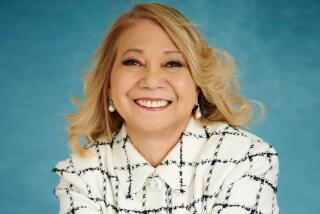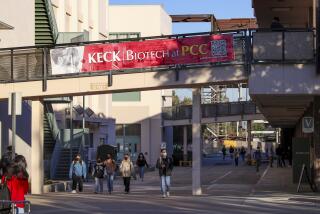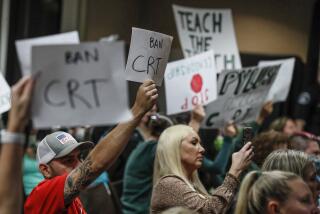O.C. Math Professor Hits the Grant Jackpot Again
- Share via
Cal State Fullerton professor David Pagni’s career has been dedicated to making students better in math, maybe even getting them to enjoy the subject.
He has dressed as a magician for elementary school students, taught high school math classes just for girls. He transformed the song “The 12 Days of Christmas” into a math exercise.
Pagni hit the jackpot this week when he received the largest grant for a Cal State Fullerton professor, nearly $6.5 million from the National Science Foundation to spend the next five years showing teachers how to teach advanced math at four O.C. high schools and their feeder middle schools.
The largest previous research grant for a Fullerton professor was $6 million, also from the foundation. The previous record holder? Pagni, for a program to improve how math is taught to Santa Ana elementary students.
Pagni, 61, took news of the grant in stride Wednesday. “This is just another day at the office,” he said. “This is what we do at Cal State Fullerton.”
As part of the same national effort aimed at improving education in kindergarten through 12th grade, UC Irvine this week received a $14.2-million foundation grant to develop teachers in math and science, most of it to be used at Orange County schools.
Pagni is not alone in his project. He will head a team that will place CSUF math professors and full-time teaching coaches at Buena Park High, Los Amigos High in Fountain Valley, Santiago High in Garden Grove and Orange High.
They will work not only with the teachers, administrators and parents at the high schools, but also with their counterparts at the middle schools who send them students. The idea is that better math instruction in middle school will result in more high school students being prepared for advanced classes such as calculus and math analysis.
The 100 or so faculty involved will take 10 days of classes during the summer and another 10 during the school year. Teachers who don’t know the subject well enough also will receive lessons.
Pagni said he doesn’t have all the answers to boosting students’ math skills.
“This is a research problem,” he said. “We have to learn from research and be doing research ourselves to find how we can crack the case, because no one has cracked it yet.”
Instead of using annual standardized test scores to rank schools, Pagni’s group will analyze the exams to see where students are not doing well. They’ll also be looking for particular classes that are especially successful and to find teachers whose techniques are working.
“We have so much test stuff back from the state that people don’t know how to use,” Pagni said.
Teachers also will meet regularly to discuss what works and what doesn’t. “If I have to say there is one big idea, we want to bring the teachers together as a team to solve these problems,” Pagni said.
Ultimately, though, it is the students who will benefit. “The question is, what do we have to do differently to get success?”
More to Read
Sign up for Essential California
The most important California stories and recommendations in your inbox every morning.
You may occasionally receive promotional content from the Los Angeles Times.














